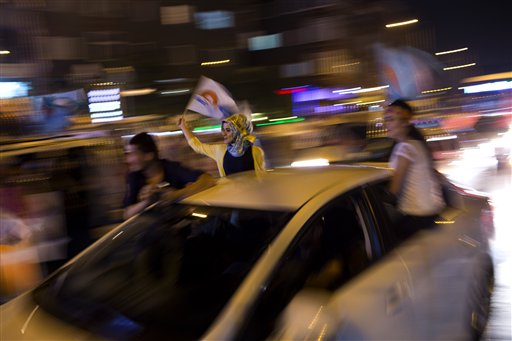Erdogan wins Turkey's presidential election
Sunday, August 10, 2014
ANKARA, Turkey - Prime Minister Recep Tayyip Erdogan won Turkey's first direct presidential election Sunday, striking a conciliatory tone toward critics who fear he is bent on a power grab as he embarks on another five years at the country's helm.
"I will not be the president of only those who voted for me, I will be the president of 77 million," Erdogan said in a victory speech delivered from the balcony of his Justice and Development Party headquarters in Ankara.
"Today the national will won once again, today democracy won once again," he told thousands of flag-waving, cheering supporters. "Those who didn't vote for me won as much as those who did, those who don't like me won as much as those who do."
The three-term prime minister's message of unity was in stark contrast to his mostly bitter, divisive pre-election campaign, when he poured scorn on his opponents, casted doubt on their Turkish identity and even accused his main challenger of being part of a shadowy coup conspiracy he said was run by a former associate living in the United States.
"I want to build a new future, as of today, with an understanding of a societal reconciliation, by regarding our differences as richness, and by pointing out not our differences but our common values," he said.
Sixty-year-old Erdogan is revered by many as a man of the people who ushered in a period of economic prosperity, but reviled by others as an increasingly autocratic leader trying to impose his religious and conservative views on a country with strong secular traditions.
His critics have accused him of running a heavily lopsided, unfair campaign, using the assets available to him through his office as prime minister to dominate media exposure and travel across the country. His office has rejected these claims.
"Erdogan did not win a victory today, he moved to (the presidential palace of) Cankaya through chicanery, cheating, deception and trickery," said Devlet Bahceli, the leader of the Nationalist Action Party which backed Erdogan's main rival, Ekmeleddin Ihsanoglu.
"This person is too questionable and dubious to be seen as president," he said.
With 99 percent of ballot boxes counted, Erdogan had 51.95 percent of the vote, according to figures from the state-run Anadolu news agency, which had reporters at ballot counting stations across the country. Ihsanoglu had 38.34 percent and the third candidate, Selahattin Demirtas, had 9.71 percent.
Supreme Election Council head Sadi Guven said Erdogan had won but that no official results would be released until Monday.
"The result was not a surprise. Opinion polls had indicated that he would obtain around 54 to 58 percent of the vote. He had dominated the election campaign," said Fadi Hakura, an associate fellow at the Chatham House think tank in London.
"Mr. Erdogan will perceive this result as a decisive mandate to push ahead with his plans for an executive form of presidency," he said.
Erdogan has vowed to transform the presidency from a largely ceremonial post into a powerful position - something his detractors say proves he is bent on a power grab. He has said he will activate the post's rarely used dormant powers - a legacy of a 1980 coup - including the ability to call parliament and summon and preside over Cabinet meetings.
Hakura said the result would not alter Turkey's course.
"Nothing will change much," he said. "Neither his style of governance, neither domestic policy nor Turkey's external policy."
Legislator Huseyin Celik, the AKP spokesman, said the party - which now must elect a new party leader and designate a prime minister to replace Erdogan - would hold a meeting during the night and another one on Monday. Erdogan is widely expected to appoint a compliant prime minister so he can continue to exert control.
Party rules barred Erdogan from serving another term as prime minister. Turkish presidents used to be elected by parliament but Erdogan's government pushed through a constitutional amendment in 2007, changing the procedure to a popular vote.

